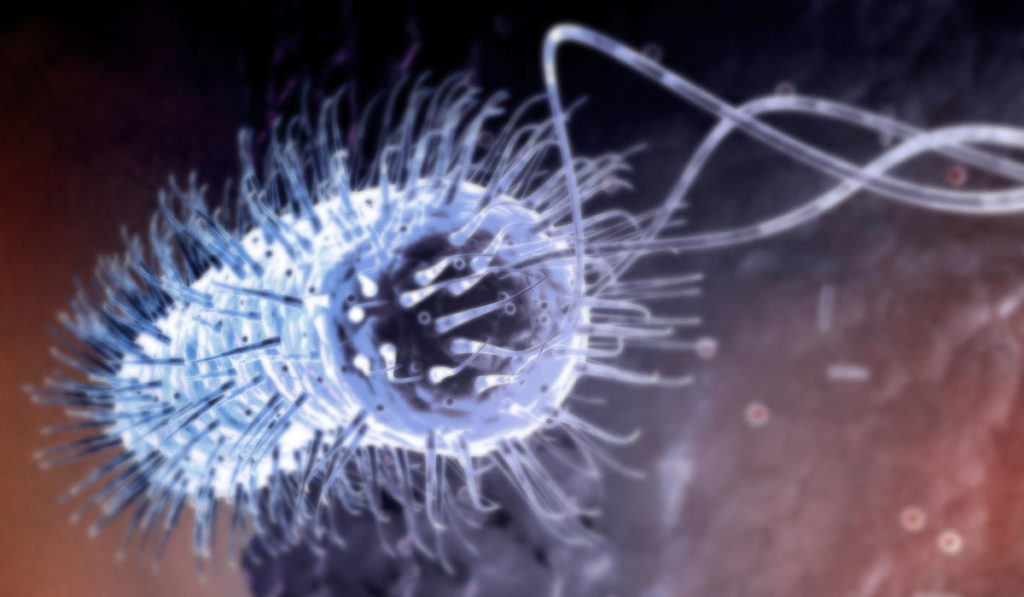Heliobacter pylori has been linked to chronic inflammation of the stomach, which can lead to atrophic gastritis and, ultimately, to gastric cancer. While only one percent of infected cases progress to cancer, the number still represents approximately one million cases per year worldwide.
Although it is possible to treat H. pylori infection at the gastritis stage, it is not clear which cases to treat. H. pylori may actually have some protective effects—esophageal reflux disease, asthma and other inflammatory disorders appear to occur more frequently in people who are not infected with the bacterium.
“H. pylori has co-evolved with humans for at least 60,000 years, probably longer, and attempting to prevent stomach cancer by eliminating the infection with widespread use of antibiotics is not necessarily a good idea,” said Keith Wilson, M.D., Thomas F. Frist Sr. Professor of Medicine and professor of pathology, microbiology and immunology at Vanderbilt University Medical Center.
In a recent study reported in Proceedings of the National Academy of Sciences (PNAS), Wilson and a team of investigators at the Vanderbilt Center for Mucosal Inflammation and Cancer found that a drug currently being tested as a chemoprevention agent for multiple types of cancer, difluoromethylornithine (DFMO), acts directly on H. pylori to reduce its virulence—without having to eliminate it.
DFMO Mechanisms
Wilson and colleagues had previously linked the production of cell growth compounds called polyamines to stomach cancer in an H. pylori-infected mouse model. In that study, the team demonstrated that treatment of the mice with DFMO prevents stomach cancer, by inhibiting an enzyme key to polyamine production.
“Bacterial strains coming from DFMO-treated animals have reduced ability to move this virulence factor into epithelial cells.”
“What we noticed is that bacterial strains coming from DFMO-treated animals have reduced ability to move this virulence factor into epithelial cells,” said J. Carolina Sierra, Ph.D., research instructor in medicine at Vanderbilt.
Their findings were the basis for an ongoing clinical trial of DFMO for stomach cancer prevention. Patients with pre-malignant lesions in the stomach, as determined by endoscopy, are enrolled in the trial and tested for DNA damage and disease progression in the stomach.
DFMO and Genetic Mutation
The PNAS study further explored how DFMO works. Investigators collected H. pylori bacteria from infected animals that had been treated (or not) with DFMO. Sierra assessed the activity of one of the main H. pylori virulence factors, the CagA protein. H. pylori injects CagA into stomach epithelial cells, where it contributes to oncogenic signaling pathways.
The researchers discovered that DFMO treatment—in vivo and in vitro—caused mutations in the H. pylori gene that encodes CagY, part of the translocation machinery that injects CagA into cells. Animals infected with H. pylori strains containing mutations in CagY did not develop stomach cancer.
“This drug (DFMO)… has what some might call ‘off target’ effects: it causes mutations in an H. pylori gene that affects the translocation of CagA.”
“This drug (DFMO), which inhibits a very specific enzymatic pathway, also has what some might call ‘off target’ effects: it causes mutations in an H. pylori gene that affects the translocation of CagA,” Wilson said. “The vast majority of gastric cancer is associated with strains that are CagA-positive. If this drug interferes with CagA activity, that’s an added bonus.” Other Vanderbilt researchers have shown disrupting CagA expression could be a promising approach to combating H. pylori virulence.
Next Steps
The investigators plan to analyze H. pylori strains isolated from DFMO-treated patients in the current trial to determine if there is a similar reduction of bacterial virulence in people. “We would also really like to do some sort of smaller trial in patients with gastritis and H. pylori that’s readily detectable to show that DFMO for six months has some beneficial effect on the microbe,” Wilson said in a June 19 interview in Oncology.
Wilson says the team will continue to study the mechanisms of H. pylori infection and other possible agents. “There is a lot of interest in combining other drugs with DFMO. We’re still doing mechanistic studies in my lab looking at other components of this polyamine pathway and other potential targets.”






